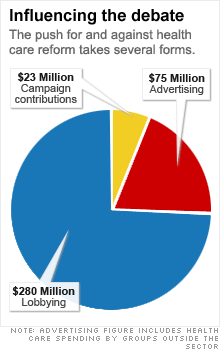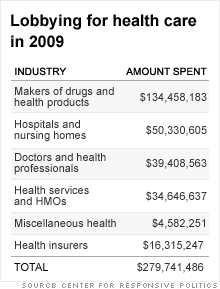Health care lobbying: Political power machine
Lobbying. TV ads. Political donations. Nearly $400 million has already been spent to influence the debate - the most expensive fight ever to hit Congress.


WASHINGTON (CNNMoney.com) -- The fight over health care overhaul is on track to be the most expensive issue ever to hit the hallways of Congress.
The bill for lobbyists, television ads and political donations has topped $375 million -- or enough to pay the entire insurance tab for about 30,000 families a year.
The big spenders range from drug companies, hospitals and doctor groups to organizations that advocate for unions, immigrants and retirees.
The largest chunk has gone to direct lobbying of lawmakers and other policymakers. In the first half of 2009, the health care industry spent nearly $280 million on lobbyists, according to the Center for Responsive Politics.
Another $75 million was spent on television advertising airtime by health care interests, mostly politically left-leaning groups and health industries. And another $23 million has flowed from the health care sector into the campaign war chests of 2010 candidates for federal office, on the heels of some $95 million raised during the 2008 cycle.
"The health sector is on track in 2009 to spend more on lobbying than it has on any other year in U.S. history -- and by a lot," said Dave Levinthal of the Center for Responsive Politics, which analyzes and collects lobbying and campaign spending figures.
Part of the reason for the big price tag is that so many different types of groups and companies could be affected by health care reform. Business models could be upended -- for better or worse -- for everything from urgent care clinics to providers of electronic medical records.
Lobbyists have been hired for groups as varied as the College of American Pathologists, which has spent $775,717 on lobbying this year, and the prestigious University of Texas M.D. Anderson Cancer Center, which spent $220,000.
The other reason for the big bucks is the duration of the debate. Every week it goes on, millions more are spent trying to influence the negotiations.
The lobbying figures alone are on track to exceed half-a-billion-dollar mark by the end of the year, which would be a record.
The big payoff for such spending? Open doors to policy makers.
Consider that Richard Umbdenstock, who heads the American Hospital Association, has spent $7 million on lobbying this year and made seven White House visits since March to talk to staffers, according to a White House letter to Citizens for Responsibility and Ethics, a nonprofit watchdog group that sued to get such information.
Other advocates that have made White House visits include the head of the lobbing group for drug makers, Pharmaceutical Research and Manufacturers of America, and the head of the health insurance lobbying group, America's Health Insurance Plans.
"Health care is supposed to be a personal issue that addresses the issues of individual Americans, but now it's addressing drug and insurance industry concerns, thanks to their lobbyists," said Christine Hines of Public Citizen, a nonprofit group that tracks money and power on the Hill.
Yet, lobbying and advertising is guaranteed by the Constitution. And several big spenders, such as the Pharmaceutical Research and Manufacturers of America, say they're educating not advocating for any particular bill.
"All of our advertising to date has been done to raise awareness of the importance of passing bipartisan health care reform this year," said Ken Johnson, a senior vice president at the pharmaceutical group, which has spent $13 million on lobbying this year.
Johnson points out that his association's members have told policymakers they'll commit $80 billion to cutting costs over the next 10 years. However, the group is also wary of legislative attempts to allow government to use its purchasing power to force drugmakers to negotiate pricing or allow cheaper foreign drugs to be imported.
"Our companies directly employ nearly 700,000 workers around the country as well as another 2.5 million indirectly," Johnson said. "I would say that we have a pretty significant stake in this debate, too."
A popular way to influence public opinion is through television ads, and August was the biggest month this year for health care advocacy ads, according to the Campaign Media Analysis Group.
About $1 million a day has been spent on health care reform TV ads since June, said Evan Tracey, president of the the media research group.
In August alone, $20 million was spent on 34,000 ads, with foes of congressional reform proposals outspending proponents. Earlier in the year ads supporting reform outnumbered those opposing by a margin of 2-to-1.
The buyers range from left-leaning groups Health Care for America Now, whose members include unions and immigrant advocacy groups, to the U.S. Chamber of Commerce and anti-tax groups such as Our Country Deserves Better.
"What you've got is the perfect storm of lots of stakeholders who have access to all kinds of capital, so they're putting everything into this," said Tracey, whose group consults for CNN. "Everyone has a dog in this fight. That's what is compounding this from an advocacy perspective."
Another way to influence the debate is through election campaign contributions. Although it is early in the 2010 election cycle, the health care sector has contributed $23 million, according to the Center for Responsive Politics.
One of the biggest beneficiaries has been conservative Blue Dog Democrats.
Many Blue Dogs are on the fence about controversial health care issues, such as whether to create government-run insurance plans. Their votes are crucial to passing a final bill, so they also tend to attract more attention and campaign contributions than other Democrats and Republicans.
Health and accident insurers, HMOs and health services organizations increased their contributions to Blue Dogs from $106,200 in the first quarter of 2009 to $122,650 in the second, according to the Center for Responsive Politics.
That is a 15% increase. By comparison, Democrats not in the Blue Dog group saw a 3% hike in contributions. ![]()


